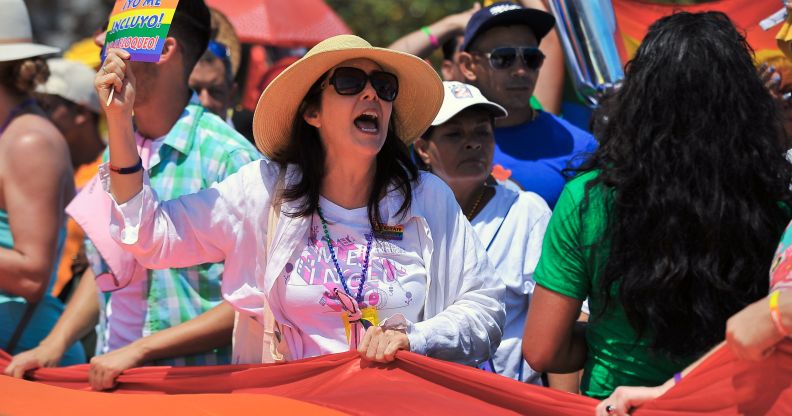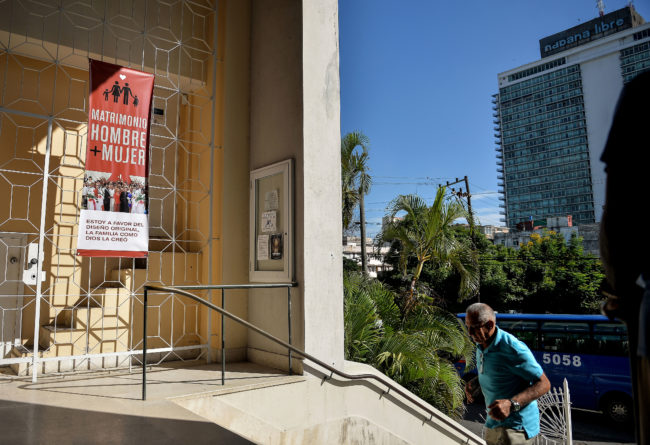Cuba gay marriage option dropped from new constitution

Cuban director of the Cuban National Center for Sex Education (CENESEX) Mariela Castro, daughter of President Raul Castro, participates in a march against homophobia (YAMIL LAGE/AFP/Getty Images)
Cuban director of the Cuban National Center for Sex Education (CENESEX) Mariela Castro, daughter of President Raul Castro, participates in a march against homophobia (YAMIL LAGE/AFP/Getty Images)
Cuba’s new constitution will not include any reference to straight or gay marriage, the commission in charge of drafting a new version of the Cold War-era document has decided.
The National Assembly, Cuba’s legislative body, shared the news via its Twitter account on Tuesday (December 18), as part of lawmakers’ wider discussion of the draft document.
“The Commission proposes to defer the concept of marriage, i.e. to leave it out of the constitutional draft, as a way to respect all opinions,” the tweet read.
An earlier draft of the constitution released in July had proposed to define marriage in gender-neutral terms, thus opening the door to marriage equality.
“The new draft erases the gender binary and heteronormativity which defined marriage in the 1976 constitution.”
— Mariela Castro
The change to Article 68 was fiercely opposed by the religious forces in the country, who insisted on keeping the definition of marriage as the union of a man and a woman.
The evangelical and Catholic churches had already begun campaigning against the constitutional changes, which need to be approved in a popular referendum before being officially implemented.

A poster defining marriage as the union of a man and woman is seen at a Methodist Church in Havana, Cuba, on September 20, 2018. (Yamil Lage/AFP/Getty)
Efforts to modernise the 1976 constitution were initiated by the island’s new president Miguel Diaz-Canel, who expressed support for gay marriage.
Diaz-Canel succeeded former president Raul Castro, whose daughter Mariela Castro has been at the forefront of the fight for gay marriage and LGBT+ rights in the country.
LGBT+ people in Cuba were once persecuted and sent to prison labor camps under the leadership of Fidel Castro, who led a coup against the US-backed regime of Fulgencio Batista in 1959.
Homosexual acts were decriminalised in 1979 and in 2006 Castro admitted his responsibility in the “great injustice” against the LGBT+ community.
Mariela Castro says new draft is progress for gay marriage and LGBT+ rights
Mariela Castro, who is the director of Cuba’s National Centre for Sex Education and has championed initiatives such as making the state pay for gender affirmation surgeries and same-sex couples adoption, explained on Twitter that the commission’s decision to exclude marriage from the constitutional draft is not a defeat.
“The new formula supports the essence of the previously proposed article (68) as it erases the gender binary and heteronormativity which defined marriage in the 1976 constitution,” she wrote.
She shared another tweet from the National Assembly that read: “A chapter on family will be incorporated, which recognises legal and de facto bonds, and the right of each citizen to form a family, without distinction of its nature.”
But the reform of this family code would be treated as separate from the constitutional draft, and would be implemented only after the new constitution is approved, Al-Jazeera reported.
Castro wrote that LGBT+ Cubans should focus on voting to pass the new constitutional draft before carrying on the fight for gay marriage and parenting rights in the family code.
She wrote: “The essence of article 68 is maintained, the fight continues, now let’s give a yes to the constitution and then close ranks to achieve a Family Code as advanced as the new constitutional text. Cuba is ours.”

